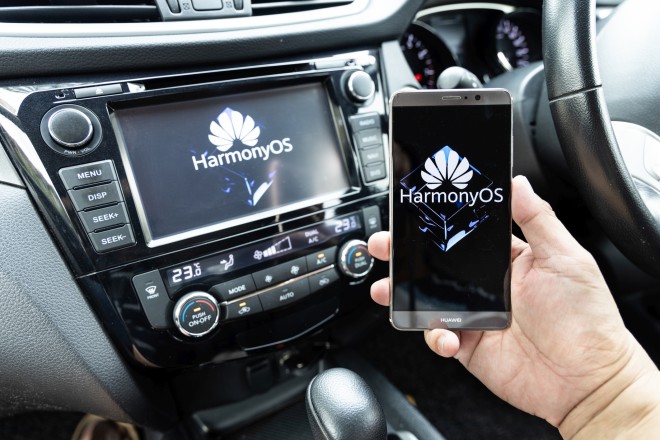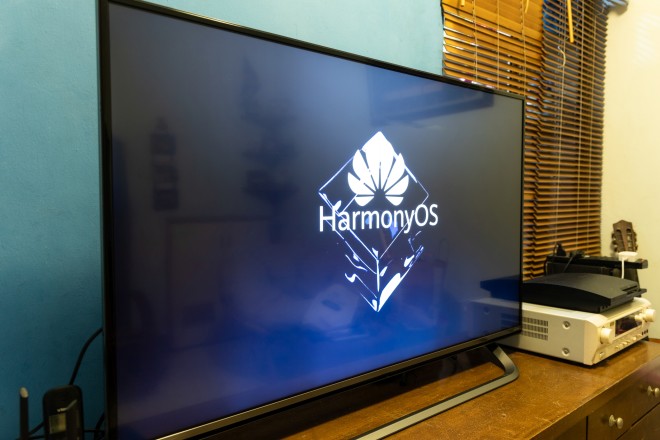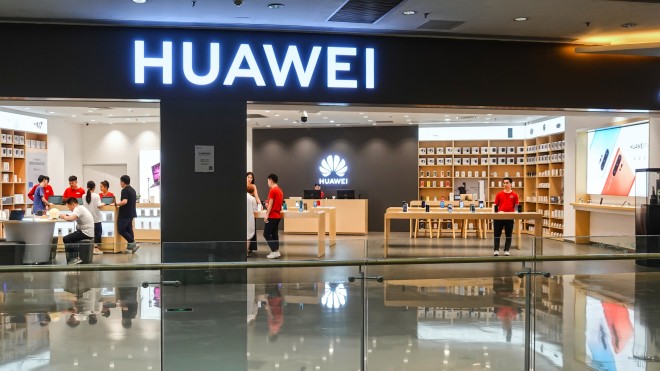The trade war between the US and China is raging on, and it's prompting both parties to look for ways to reduce their mutual economic dependency. In the IT sector, one of the biggest bargaining chips is the declaration of a national emergency concerning telecommunication, as already done by president Trump. This decree can, and already has been, used to ban Chinese companies from cooperation with US companies. And it has become painfully obvious that companies like Huawei, so far, don't have viable alternatives once they're cut off from cooperation with Alphabet/Google. Naturally, the most prestigious Chinese company didn't take this lying down, which is why Richard Yu, CEO of Huawei, recently presented an operating system poised to run on virtually every device, including cellphones, tablets, TVs and cars. Enter Harmony OS.

The goal: A super-lean, fully compatible OS that runs on any device that requires a dedicated operating system. Cellphones and tablets are the first that come to mind but that's only the tip of the iceberg. Smartwatches, smart speakers, cars, refrigerators, dolls—they're all potential candidates for Harmony OS. This means Harmony will bridge the gap between low-spec devices, like toys with only a few KBs of RAM, and beefier gadgets with multiple gigabytes, putting and end to OS fragmentation in the mobile realm. The internet of things, with its billions of devices from surveillance cams and smart fridges to industrial robots, could theoretically run entirely on Harmony OS. And, while feature trade-offs would certainly still have to be made, one OS means less incompatibilities and easier inter-device communication.
For all of this to work, Huawei are basing their OS on a microkernel rather than going the traditional monolithic route. As the name implies, microkernels are minimalist operating system kernels that provide only the most basic of mechanisms, such as low-level memory management, thread management and inter-process communication. Other services, like networking, are kept out of the kernel and run in what is called user-space. In contrast, Windows, macOS and Unix-based OSes typically use monolithic kernels that contain all operating system core functions and device drivers. Think of a microkernel as a janitor with a few clearly defined tasks and a handful of keys to perform said tasks. Accessing additional rooms requires the help of service workers, each with their own dedicated keys. With monolithic kernels, the janitor practically has all the keys and can access any room at will. Though this creates less overhead, since there's no need to ask for help to get into certain rooms, it also poses a security risk. Harmony OS is therefore believed to be a fairly secure system.

One of the biggest hurdles: Customers in the west are unlikely to jump on the bandwagon. If you find it funny that your grandparents always go the same restaurant, they've got nothing on the technological conservatism of cellphone users. Many of them expect (and demand) that everything looks and works the way it has always been and pleasurably pick new features to pieces in online groups and forums. Confronting these folks with an entirely new OS might not be a good idea. So what can you do? You can either copy the dominant systems to a fault or experiment with new ideas without veering too far off the beaten track. The latter can be difficult, as competitor Xiaomi found out with their own MIUI user interface. It was only after the switch to vanilla Android that they gained considerable traction in the mobile marketplace. Another roadblock: Harmony-based cellphones may completely lack Google's services—a veritable no-go for western customers. Naturally, the entry barrier for Harmony OS is a lot lower in China, where Google's services are blocked anyway.
Even if Huawei manage to mitigate or eliminate the aforementioned issues, one major obstacle remains: apps. Nowadays, it's apps that make or break a product. If you've witnessed the slow and sad demise of Windows Phone, you'll agree that, unless all popular apps are available, and I'm talking about the real deal, not some feature-trimmed crutch, any new platform will face an unwinnable uphill battle. In this respect, Huawei have set the bar exceptionally high for themselves: In the future, all HTML 5, Linux and Android-based apps are said to run on Harmony OS. They're promising no less than total compatibility. Time will tell whether the platform can live up to this lofty promise. But let's say they manage to pull this off, how are users going to get their apps? They almost certainly won't have access to Google Playstore. Huawei will have to come up with their own China-based app store, and that alone could make some users feel uneasy about new installations.

After all,trust cannot be implemented, it has to be earned. This is where Huawei will face their toughest battle yet. Alleviating western fears that a device purchase exposes them to Chinese authorities is no easy feat. Perhaps that is why Huawei have open-sourced their new OS. Hundreds of thousands of tech-savvy enthusiasts now have the option to vet every single line of code for potential backdoors. Also, Huawei are working hard to plug their OS to other companies—and things are looking promising in the Asian marketplace, not least because of past (US-inspired) events. We as end-users will have to wait for the first public release to form our own opinions. In any case, competition is good for business so: Welcome, Harmony!
What I would like to know: Are you willing to trust a Chinese-made operating system?




I do not trust any Chinese software
Känns inte som jag har så mycket att välja på med en PEUGOT OCH ANDROID
Tyvärr är operativsystemen i bilar ofta inaktuella och funktionsområdet är dåligt. (Google translated)
Being "open sourced" will allow oversight by anyone that is programming proficient. Other operating systems have been around for a long time, namely Linux, that have been analyzed and improved by individuals. Huawei is wise to go that route but, unless the OS can exceed the capabilities of Chrome, Apple or Microsoft it will not be widely accepted.
One system would be nice, but what about limits? You can only do what "they" allow.
Who is spying? Everyone is spying.
Be different, stay unique. Let "them" conform to you.
Обнадёживающе ! Время покажет . Было-бы интересно протестировать .
How long before the spying starts? What they gonna steal? My brother's Phone number? Or maybe they want to play the casino app I play? There's the thing. Trump yells about China spying with this company's phones but who are they spying on? All he had to do was forbid Government employees from using them. The man is simply crazy. I'd use it in a heartbeat if it can replace Microsoft products!
In theory it sounds great.
But, how long before the spying starts?
I would certainly give them a try. After all, Chinese products are renowned for their quality and longevity, and it may even lead to a price war and a subsequent competition which is welcome news.
Huawei have the option of running an Apps Store for Harmony OS in the west; ideally in the EU where they would be subject to GDPR. This would go some way towards earning them an early level of trust, especially among EU customers.
Huawei are no strangers to investing in EU countries (https://www.rte.ie/news/business/2019/0827/1071190-huawei-investing-70m-in-irish-rd/) and the Irish Data Protection Commissioner is already responsible for ensuring GDPR and related regulations are observed by Facebook, Google, Microsoft and many more international companies beside, who have their EU headquarters and many data centers in Ireland.
I for one, would like to give it a try, feeling that Windows has been dominant for far too long.
Not yet
Well I have enough to worry about hackers and I would have to count on a new source. to rely on. Think I will stay and fight the demons I am use to.
A friend recently returned from a trip to see his family in China. He picked up a cell phone for $10.00 before returning. There isn't a cell phone on the market in the west to compare it to. Lightning speed with everything people want built into it. Old world, the US, thinking is finally fading away. Brag all they want without realizing they haven't invented anything of interest in four decades. I am fully aware of how MS spies on our keystrokes, finger prints, eyes, mood and more.
Here's to hoping China will blow the cover off the insane high price we pay for cell phones on top of the costs to connect to the Internet.
I would trust China-made OS no less than US-made one, subject to the control of a lying government, which is itself subjugated by we-don't-know-who.
china has great products ,like cellphones and laptops
Why, apart from the propaganda, are we really expected to believe that western governments are less involved with global tech companies than the Chinese government
That's exactly why I ask these questions. :) I consider black and white thinking with good and bad guys too simplistic.
Certainly .. I trust the capabilities and capabilities of Huawei
Hell No
China wants to own & run the world & this is just another step in achieving their goal.
I hear Hong Kong anxiously awaits this new OS, ha ha ha ha as does Japan, So Korea and many more.
I'd probably try Harmony and see if it had any features that were different/better than current Linux options. I'm interested in computer operating systems and have found Ubuntu and Mint both work well. Both are Windows-like and open source software similar to Office is available. I also use Chrome OS which is great. I've used Chinese based software and some are very good. So if an OS is open source with positive reviews, I tend to at least, test it. I also tend to believe tech reviews rather than U.S. political leaders whether something is worth checking out.
Yep: and a micro kernal system is a better idea.
As soon as the Orange man said he was going to stop Google, Apple et al selling software into China I knew the Chinese would come up with their own OS.
Microsoft, Apple, Google etc... have proven how UNtrustworthy they are.
Open source software will be the future, vetted by the people for the people.
Let's let the chips fall where they may.......
Quality of product and ability of apps is the important thing and the Chinese know how to do this. Open source gives us more trust in the product than with most US controlled IT stuff
I find this deeply disturbing. Huawei have direct links to the Chinese government, and here in Australia we are deeply concerned about Chinese hacking into our major government instrumentalies. In Australia, and probably elsewhere, Huawei are quoting on telecommunications tenders and we are not giving tenders to them for anything that gains them access to our internal telecommunications. There is absolutely no way I would install an operating system, or any other computer tool, that originates from that company.
Sounds GOOD IF IT STAYS OPEN SOURCE, You can also try ReactOS At https://reactos.org/ for PC's if you don't like Micro$oft & want to keep your windows program.
Absolutely not. I don't trust anything the Chinese do.Their track record speaks for itself.